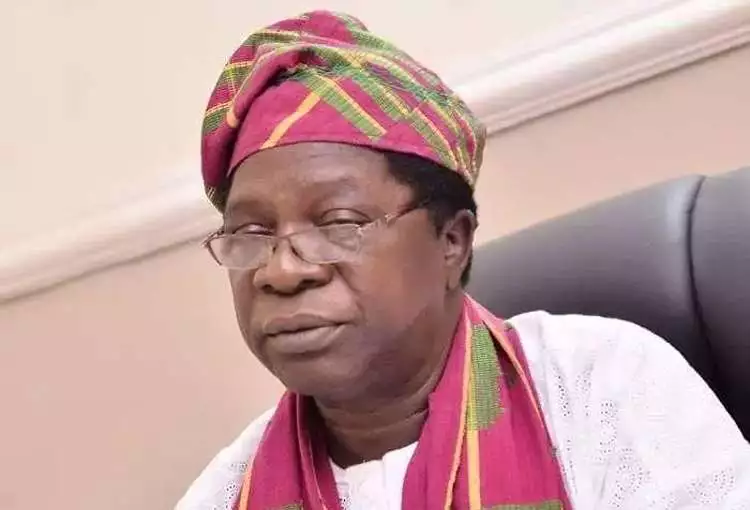Veteran labour leader and former member, House of Representatives, Chief Joseph Akinlaja has listed some impediments against tackling insecurity in Nigeria.
Chief Akinlaja, a two time Reps member for Ondo East and Ondo West identified compromise by officers manning the different points of entry into Nigeria that allow illegal entry of weapons into the country; the officers and operations to thwart the efforts of bandits and terrorists that are compromised.
According to him, the citizens who know and can identify the bandits and terrorists yet do not disclose the information to appropriate authority also compromise the fight against insecurity.
He was speaking, while delivering a lecture titled “Insecurity: Roles of the Society and the Media,” in Akure at the public lecture and award nite, organized by Corespondents Chapel of the Ondo state Council of Nigeria Union of Journalists, (NUJ).
“Interestingly, these same individuals turn around to expect there should be peace and calm everywhere. Where are those weapons from, what are they meant for.
“These acts are perpetuated by those whose moral upbringing is suspicious. Those who have lowered their level of moral uprightness and for these reasons see nothing absolutely wrong in these acts.”
The veteran labour leader listed Causes of insecurity to include “unemployment; corruption; imbalance in development; weak judicial system; illiteracy; inadequacy of basic amenities, whether social or infrastructural; narcotic/psychotropic substances; open borders; influx of arms especially, small arms and light weapons; inadequate distribution of wealth; ethno-religious animosity and shrinking socio-cultural value system, etc.
“Socio-cultural value system
Almost on a daily, weekly and monthly basis, security agencies kill or arrest large numbers of criminals and bandits. Focusing on terrorism alone, since the very serious crackdowns on Boko Haram terrorists, several thousands of the fighters have been killed and some of their enclaves have been destroyed.
“But, is it not curious that since the spate of killings of the terrorists and destruction of their enclaves, they keep striking? Certainly, there is a stream or reservoir that is bolstering their ranks. This is evident in the number of suicide missions conducted particularly by teenagers.
“It is said that as citizens whether individual or corporate, if everyone accounts for every family member and upholds the tenets of moral, religious, cultural, societal and traditional values, there would be no terrorists, bandits, robbers, arms smugglers, child traffickers, cattle rustlers, militants, corruption etc.
“Subsequently, the work of the government, military and security agencies would be easier. There is a social orientation campaign which says, ‘‘if you see something, say something’’
“I found this to be profound, instructive and lucid, and suffices for everyone to key into this. Once our societies are populated with good moral and religious behaviours, the fight against insecurity would be easier to win. Once absolute peace is restored, the atmosphere would be created for our youths to unleash their creative potentials and the economy would grow at exponential rate.
Chief Akinlaja observed that the roles of the media in tackling insecurity, are limited by “lots of challenges, ranging from poor welfare package for media practitioners, lack of continuous and constant training and retraining exercises for media workers, the tendency of journalists to be self-censored for fear of victimization by their employers to reluctance of citizens to give information for fear of being attacked.
“As the fourth estate of the realm, the media determine dominant values, perceptions and attitudes of the society by its impact on it. The importance of the media in addressing national security in a democratic setting cannot be overemphasized as it is the bridge between the people and its societal activities.
“For any activity to get noticed, it must be reported by the media. The media must therefore make national security part of its principal agenda so as to make positive impacts.
“Section 22 of the 1999 Constitution of the Federal Republic of Nigeria as amended entrusted the media with the power to monitor governance and uphold the Fundamental Objectives and Directive Principles of State Policy as enshrined in Chapter 2 of the Constitution.
“The media need to set agenda for themselves in tackling insecurity. It must also provide platforms to the religious leaders to preach and admonish against criminal acts of any kind especially terrorism, kidnapping, banditry, armed robbery, ritual killing etc. This will not only make security issues attract attention but also raise citizens’ consciousness to security and crimes matters.”
Discover more from The Source
Subscribe to get the latest posts sent to your email.








